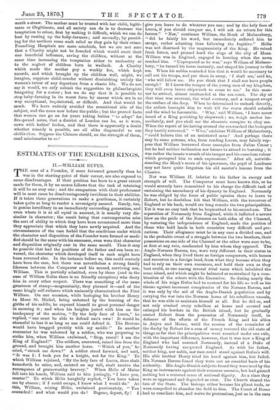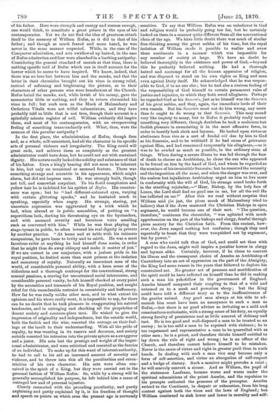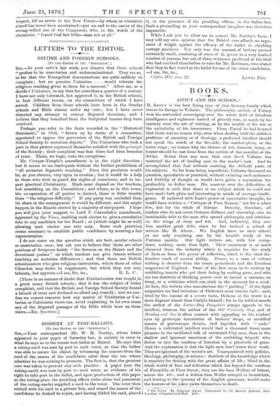ESTIMATES OF THE ENGLISH KINGS.
II.—WILLIAM RUFUS. THE sons of a Founder, if more favoured generally than he was in the starting-point of their career, are also exposed to some disadvantages. if their position has been to a great extent wade for them, it by no means follows that the task of retaining it will be an easy one ; and the comparison with their predecessor will in most cases be disadvantageously invidious to their abilities. If it takes three generations to make a gentleman, it certainly -takes quite as long to render a sovereignty assured. Rarely, too, is genius hereditary in an immediately succeeding generation, and give you leave to do whatever you can ; and by the holy face of Lucca, if you should conquer me, I will ask no return for this favour." "Nor," continues William, the Monk of Malmesbury, " did he falsify his word, but immediately suffered him to escape, rather admiring than following the fugitive." Helie was not disarmed by the magnatninity of the King. He raised fresh forces, and pressed hard the siege of the city of Mans. William was in England, engaged in hunting when the news reached him. "Unprepared as he was," says William of Malmea- bury, " he turned his horse instantly, and shaped his journey to the sea. When his nobles reminded him that it would be necessary to call out his troops, and put them in array, ' I shall see,' said he, who will follow me. Do you think that I shall not have people enough? If I know the temper of the young men of my kingdom, they will even brave shipwreck to come to me.' In this man- ner he arrived, almost unattended at the sea-coast. The sky at that time was overcast, the wind contrary, and a tempest swept the surface of the deep. When he determined to embark directly, the sailors besought him to wait till the storm should subside and the wind be favourable. Why,' said William, ' I have never heard of a King perishing by shipwreck ; no, weigh anchor im- mediately, and you shall see the elements conspire to obey me. When the report of his having crossed the sea reached the besiegers they hastily retreated." " Who," exclaims William of Malmesbury, "could believe this of an unlettered man? And perhaps there may be some persons, who, from reading Lucan, may falsely sup- pose that William borrowed these examples from Julius CEesar ; but he had neither inclination nor leisure to attend to learning ; it was rather the innate warmth of his temper and his conscious valour which prompted him to such expressions." After all, notwith- standing the Monk's scorn of his ignorance, the pupil of Lanfranc may not have quite forgotten his old master's lessons from the Classics. Nor was William II. inferior to his father in energy and strength of will. The Conqueror must have known this, or he would scarcely have committed to his charge the difficult task of sustaining the ascendancy of his dynasty in England. Normandy he was obliged by the force of public opinion there to leave to Robert, but he doubtless felt that William, with the resources of England at his back, would ere long reunite the two principalities. Yet it was no easy task that he bequeathed to his second son. The separation of Normandy from England, while it inflicted a severe blow on the pride of the Normans on both sides of the Channel, by restoring the independence of England, made the position of those who held lands in both countries very difficult and pre- carious. Their allegiance must be in any case a divided one, and in the probable event of a struggle between the two brothers, their possessions on one side of the Channel or the other were sure to be, at first at any rate, confiscated by him whom they opposed. The Anglo-Norman Barons, too, were very different in their status in England, when they lived there as foreign conquerors, with homes and resources in a foreign laud, from what they became when they had to rely on their own resources, and hold their own as they best could, as one among several rival races which inhabited the same island, and which might be balanced or neutralized by a com- bination of the others with the Executive. So during nearly the whole of his reign Rufus had to contend for his life as well as his throne against incessant conspiracies of the Norman Barons, and it was only by the aid of the Anglo-Danish population and by carrying the war into the Norman home of his rebellious vassals, that he was able to maintain himself at all. But he did so, and not only crushed every rebellion at home and secured and enlarged his borders in the British island, but he gradually ousted Robert from the possession of Normandy itself, in defiance of the efforts of the French King and his allies in Anjou and Maine, until the cession of the remainder of the duchy by Robert for a sum of money restored the old state of things so far that the principalities were reunited under one rule, with the important difference, however, that it was now a King of England who had annexed Normandy, instead of a Duke of Normandy having conquered England. As with his father, neither king, nor noble, nor race could stand against Rufus's will. Ms able brother Henry tried his hand against him, but failed. His Norman Barons found they were not an essential basis of his authority. His Anglo-Danish subjects found they were used by the King as instruments against their common enemies, but had gained nothing but a restored sense of national dignity. As a class they were as oppressed and degraded as ever. The Church shared the fate of the State. The bishops either became his pliant tools, or were compelled to abandon the field to him. The Court of Rome had to conciliate him, and waive its pretensions, just as in the case of his father. Here were strength and energy and success enough, one would think, to constitute a great prince in the eyes of his contemporaries. Yet we do not find the idea of greatness attach itself to the memory of William Rufus, as it did to that of his father ; and though as much feared and more hated, he was never in the same manner respected. While, in the case of the Conqueror admiration, and awe swallowed up hatred, in the case of Rufus admiration and fear were absorbed in a loathing antipathy. Considering the general standard of morals at that time, there is nothing specific told of Rufus which can in itself account for the horror which he seems to have inspired. We know, indeed, that there was no love lost between him and the monks, and that the latter in their chronicles brought out his vices in strong relief, instead of softening and brightening the picture, as in their characters of other persons who were benefactors of the Church. Rufus hated the monks, and, while lavish of his money, gave the monasteries little or nothing, and they in return chronicled his vices in full ; but such men as the Monk of Malmesbury and Ordericus Vitalis were not wilful calumniators, and they have probably told us little that is not true, though their account is a spitefully minute register of evil. William evidently did inspire them, and most of his contemporaries, with an overpowering feeling of something transcendantly evil. What, then, were the sources of this peculiar antipathy ? In the first place, the administration of Rufus, though firm and, as a whole, self-consistent, had all the character in its specific acts of personal violence and irregularity. The King could will great ends, and achieve them as completely as the greatest administrator could have done, but he could not act with sustained dignity. His nature really lacked the solidity and substance of that of his father. Even a kingly bearing did not seem to be inherent in him, but only an occasional or assumed feature. There was something strange and eccentric in his appearance, which might alarm, but did not impress men. He was strongly built, though not tall, and somewhat corpulent. To his florid complexion and yellow hair he is indebted for his epithet of Rufus. His counten- ance was open ; but he " had different-coloured eyes, varying with certain glittering specks," and he hesitated much in speaking, especially when angry. His strange, staring, yet uncertain expression was aggravated by a trick which he had, when abroad or in public assemblies, of putting on " a supercilious look, darting his threatening eye on the bystanders, and with assumed severity and ferocious voice assailing such as conversed with him." While he was thus playing the stage-tyrant in public, he often lowered his real dignity in private by another practice. " At home and at table with his intimate companions, he gave loose to levity and to mirth. He was a most facetious railer at anything be had himself done amiss, in order that he might thus do away obloquy and make it matter of jest." If we are correct in our conjecture, with a jealous pride in his royal position, he fretted more than most princes at the isolation and monotony of royalty. Naturally an insouciant man of the world, of considerable personal ability, with a keen sense of the ridiculous and a thorough contempt for the conventional, strong sensual passions, a craving for unrestrained social intercourse, and considerable personal vanity, he felt himself checked at every point by the necessities and trammels of his Royal position, and sought relief for this unendurable restraint in eccentricity and buffoonery. How far he was really unlike other men, and to what extent his opinions and his views really went, it is impossible to say, for there can be no doubt that he took pleasure in exaggerating his natural tendencies, and in outraging and shocking all the proprieties of decent society and common-place men. He wished to give the impression of originality and independence, but the outside world, both the foolish and the wise, resented the outrage on their feel- ings or the insult to their understanding. With all the pride of royalty, he was wanting in its reserve and decorum, and society outside resented his intrusion into the private sphere as a swaggerer and a jester. His acts lost the prestige and weight of the imper- sonal administrator, and were criticized and resented as the fancies of an individual. To make up for this want of inherent authority, he had to call to his aid an increased amount of severity and violence, and he threw into this all the peculiarities and eccen- tricities of his own character. His acts were often con- ceived in the spirit of a King, but they were carried out in the personal fashion of William Rufus. So, while by a strong will he generally accomplished his purpose, he left behind him a sense of outraged law and of personal injustice. Closely connected with the preceding peculiarity, and partly explaining and partly explained by it, is his freedom of thought and speech on points on which even the present age is nervously sensitive. To say that William Rufus was an unbeliever in God and religion would be probably going too far, but he certainly looked on them in a manner quite different from all the conventional ideas of the aga. We !Ave little doubt there was much of similar free-thinking among the great nobles of his time, but the royal isolation of William made it possible to realize and avow these sentiments in a manner which was impossible for any member of society at large. We have no doubt he believed thoroughly in the existence and power of God,—beyond this he probably believed nothing. He had a thorough hatred and contempt for all the human apparatus of religion, and was disposed to stand on his own rights as King and man even against Deity itself. He acknowledged that he was respon- sible to God, if to no one else ; but he had also a curious feeling of the responsibility of God himself to certain paramount rules of justice and injustice, to which they both owed allegiance. Perhaps he regarded God as his Suzerain, just as he himself was the Suzerain of his great nobles, and they, again, the immediate lords of their own vassals. But his Suzerain must not do him wrong, any more than he ought to do wrong to that Suzerain. This may sound very like impiety to many, but to Rufus it probably really meant something very different, though doubtless he took a malicious but foolish pleasure in enunciating it in the most offensive form, in order to horrify both clerk and layman. He looked upon virtue or abstinence from vice as a sort of feudal aid due by him to God as his Suzerain, and to be withheld if he had cause of grievance against Him, and had renounced temporarily his allegiance,—as it was to be evaded as much as possible, in the ordinary state of things. When during a severe illness he was led through the fear of death to choose an Archbishop, he chose the one who appeared to be forced on him by the hand of God, and whom he regarded as the nominee of his irresistible Suzerain ; but he resented the necessity and the imposition all the same, and when the danger was over, and' the zealous but injudicious Archbishop urged on him to live more in conformity with the will of God, his strange creed broke forth in the startling rejoinder,—" Hear, Bishop, by the holy face of Lucca, the Lord shall find no good one in me, for all the evil He has inflicted on me !" After this we read without surprise that William said (in jest, the pious monk of Malmesbury tried to- believe) that if the Jews mastered the Christian Bishops in open- argument, he would become one of their sect. "The question, therefore," continues the chronicler, " was agitated with much apprehension on the part of the bishops and clergy, fearful through pious anxiety for the Christian faith. From this contest, how- ever, the Jews reaped nothing but confusion ; though they used repeatedly to boast that they were vanquished not by argument, but by power." A man who could talk thus of God, and could act thus with regard to the Jews, might well inspire a peculiar horror in clergy and laymen alike. Certainly, however, if he chose to convert his illness and the consequent choice of Anselm as Archbishop of Canterbury into an act of oppression on the part of the Almighty; the King had some reason in the years that followed to deplore his constrained act. No greater act of penance and mortification of the spirit could he have inflicted on himself than he did in making such a man his yokefellow in the government of England. Anselm himself compared their coupling to that of a wild and untamed ox to a meek and powerless sheep ; but the King could have told a different story as to the inoffensiveness of the gentler animal. Any good man always at his side to ad- monish him must have been an annoyance to such a man as Rufus,—but there is no good adviser so irritating as a mild and conscientious ecclesiastic, with a strong sense of his duty, an equally strong faculty of persistence and as little amount of delicacy and tact. He is too good and well-disposed a man to be treated as an enemy ; he is too mild a man to be repulsed with violence ; he is too impersonal and representative a man to be quarrelled with as other men ; he is a priest, and therefore thinks himself entitled to lay down the rule of right and wrong ; he is an officer of the Church, and therefore cannot believe himself to be mistaken. Never is the cause of virtue and right in greater peril than in such hands. In dealing with such a man vice may become only a form of self-assertion, and virtue an abnegation of self-respect and a badge of slavery. Such a monitor might provoke a saint ; he will scarcely convert a sinner. And so William, the pupil of the statesman Lanfrauc, became worse and worse under the spiritual admonitions of the priest Anselm, and the repulsion to his precepts outlasted the presence of the preceptor. Anselus retired to the Continent, in despair or exhaustion, from his long contest against both the vices and the laws of England ; but William continued to sink lower and lower in morality and self- respect, till an arrow in the New Fordst—by whom or wherefore aimed has never been ascertained—put an end to the career of the strong-willed son of the Conqueror, who, in the words of the chronicler, "feared God but little—man not at all."






























 Previous page
Previous page